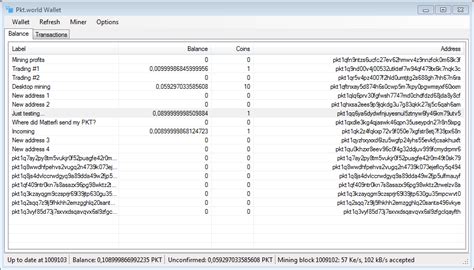Checking and Polling Ethereum Balances Using Electrum CLI and RPC
The Ethereum decentralized platform provides a robust API for interacting with the network, allowing developers to programmatically check and poll an address’s balance in various ways. In this article, we will explore how to use Electrum’s command-line interface (CLI) and Remote Procedure Call (RPC) APIs to accomplish this task.
Prerequisites
Before you begin, make sure you have:
- An Ethereum wallet configured and connected to a compatible cryptocurrency account.
- Installed library “ethers.js”: “npm install ethers” or “yarn add ethers”
- Installed Electrum CLI: [Install Electrum CLI](
Method 1: Using Electrum CLI
You can use Electrum CLI to query the balance of an Ethereum address directly from your terminal. Here are the steps:
- Get the wallet private key: Make sure you have access to the private key of the account you want to check.
- Configure the Electrum CLI:
npx @openethereum cli init --name eth-cli --default-wallet private_key
Replace “private_key” with the actual private key of your wallet.
- List all addresses
: Run the following command to display a list of all addresses in the wallet:
eth-account-list
- Query address balance: Select the address you want to check and run the following command:
eth balance --address
-count 1Replace
with the desired Ethereum address.
Method 2: Using Electrum RPC
The Electrum RPC API provides a more convenient way to interact with an Ethereum wallet, allowing you to poll balances without having to establish multiple connections. If you want to use RPC, first install the ethers.js library and import it into your application:
const { ethers } = require('ethers');
Then create a new instance of the Electrum API client:
const api = new Ethers. Wallet(privateKey);
Here is an example of querying the balance of an address using RPC:
- Get the wallet private key: Make sure you have access to the private key of the account you want to check.
- Create a new instance of the Electrum API client:
const api = new Ethers. Wallet(privateKey);
- List all addresses: Run the following command to display a list of all addresses in the wallet:
eth-account-list
- Query address balance: Select the address you want to check and run the following code:
async function getBalance(address) {
try {
const balance = await api.getBalance(address);
console.log(
} catch (error) {
console.error(error);
}
}
Replace "address" with the desired Ethereum address.
Example use cases
- Automate transactions

: You can use this method to automate transactions by polling the balance of an address and then using it as input in a script or application.
- Wallet Balance Tracking: This technology allows you to track your wallet balances in real time and ensure that your accounts are updated correctly.
By following these steps and examples, you can easily query the balances of Ethereum addresses using the Electrum CLI and RPC APIs, making it easier to manage and interact with digital assets programmatically.
